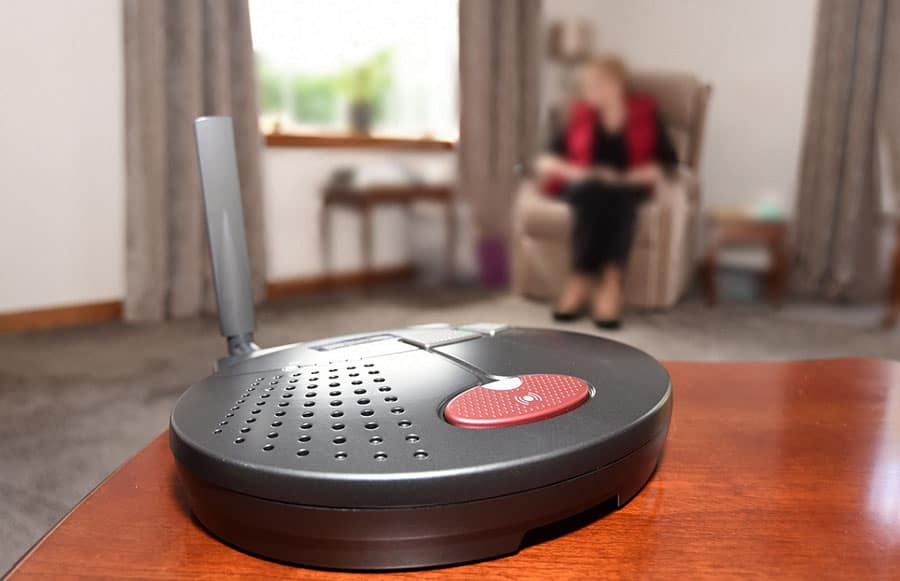Scottish council launches fully digitally enabled end-to-end telecare service

Falkirk Council has become the first local authority in Scotland to go live with an end-to-end digital telecare service, providing users with personal and home alarms that alert a control centre when they fall or are in difficulty so help can be sent.
Working alongside Falkirk Health and Social Care Partnership, the council has safeguarded its life and limb Mobile Emergency Care Service (MECS), which currently helps 4,000 vulnerable people live independently at home.
The service, which traditionally relied on analogue phone lines to operate, is now the first telecare service provided by a Scottish council to be digitally enabled end-to-end, four years before telecommunication providers switch off all analogue lines in the UK.
This “ground-breaking” progress has now been recognised, with the council and partnership awarded the Gold Level 1 Digital Telecare Implementation Award by the Digital Telecare for Scottish Local Government Programme.
Pauline Waddell, Team Manager for MECS, commented: “Becoming the first Council in Scotland to not only go live with an end-to-end digital telecare offering but also achieve recognition for it, is testament to the hard work undertaken to safeguard the critical service by all those involved in the project.
“It is only through their innovative thinking, collaborative working and quick decision making that the digital transformation of this service has got to this stage.”
The award acknowledges the service has been tested with a group of low-risk clients and migrated 20 percent of users to the fully digital service.
Martyn Wallace, Chief Digital Officer for the Digital Office for Scottish Local Government and the Senior Responsible Officer of Digital Telecare in Scotland, said: “Receiving the award is a significant achievement and robustly demonstrates the overall functionality and effectiveness of Falkirk Council and Falkirk Health and Social Care Partnership’s digital telecare solution.
“This enables them to confidently progress further on their journey and continue to share their learnings with other telecare service providers as leaders in the field.”
Knowing that telecommunication providers would switch off all analogue phones lines by 2025 led the council to launch its Analogue to Digital Telecare project, one of 23 Council of the Future projects that aim to modernise and improve services and help deliver on its priorities – Communities, Enterprise, and Innovation.
By the end of March last year, the project team, led by Pauline and Ian Whitelaw, the former Team Leader for the Contact Centre through which MECS operates, had replaced 4,000 analogue MECS alarm systems in people’s homes with pre-programmed digital-ready ones.
They’d also worked with Chubb Systems to develop and install a digital Alarm Receiving Centre, which provides immediate and secure information 24/7 to call handlers when a MECS personal alarm or sensor in a home is activated.
Now the team is working to transfer the remaining 3,200 MECS service users to the fully digital service by end 2021.
Ian, Analogue to Digital Telecare Project Manager, explained: “Our clients should feel confident that the service they rely on to live independently at home is not only cutting edge, but also more secure and more reliable than ever before. Our focus now is to build on our digital ambitions, offering new choices and services that will help them lead independent lives for as long as possible.”
The council and partnership will now work towards the Gold Level 2 Implementation Award, which requires user acceptance testing with a representative group of high-risk users, migration with this group and the solution rolled out to at least 40 percent of service users.
Once this has been achieved, the ‘Platinum’ peak award will be on the horizon, which requires the digital telecare solution to be delivered to a minimum 80 percent of service users for at least nine months.
In recent times, more and more councils have been using technology-enabled care (TEC) services to enable vulnerable residents to remain safe and independent, while easing pressure off local authorities.
Cambridgeshire County Council reported in February that its Enhanced Response Service (ERS) – which helps people with non-emergency assistance – has seen demand skyrocket since its inception in April 2017. The council said it has responded to over 6,000 call outs since it began.
Millbrook Healthcare recently won a contract, alongside Provide CIC, to deliver TEC services on behalf of Essex County Council to support independent living. The service includes the identification, deployment, installation, maintenance, decommissioning and removal of technology to meet service users’ care needs as well as supporting council staff to develop a more innovative and technological mindset when commissioning care.
Similarly, during the pandemic, East Sussex County Council launched a self-install telecare service model and welfare call checking service, in coordination with Doro Care UK, in response to the coronavirus pandemic and many people self-isolating.

